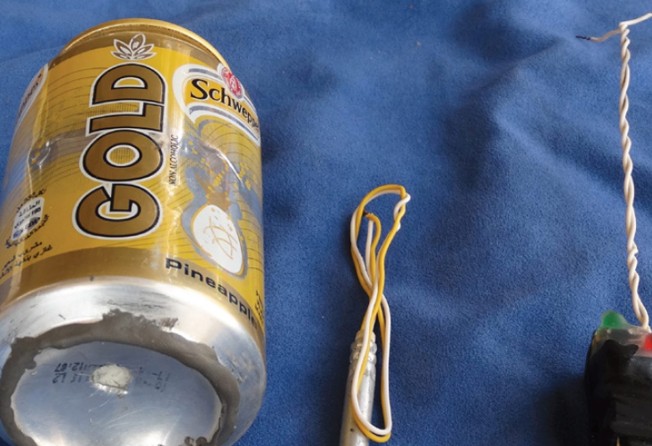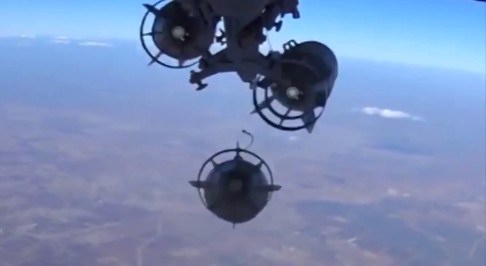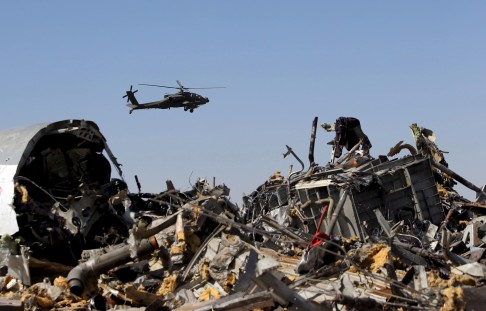The Schweppes bomb: Islamic State publishes photo of soda can device it says downed Russian airliner

Islamic State's official magazine carried a photo on Wednesday of a Schweppes drink can it said was used to make an improvised bomb that brought down a Russian airliner over Egypt's Sinai Peninsula last month, killing all 224 people on board.
The photo showed a can of Schweppes Gold soft drink and what appeared to be a detonator and switch on a blue background, three simple components that if genuine are likely to cause concern for airline safety officials worldwide.
"The divided Crusaders of the East and West thought themselves safe in their jets as they cowardly bombarded the Muslims of the Caliphate," the English-language Dabiq magazine said in reference to Russia and the West. "And so revenge was exacted upon those who felt safe in the cockpits."
Russian media reports have said the bomb that downed the at the end of October was likely smuggled on board by personnel at Sharm el-Sheikh airport and set off by a timer.
On Tuesday the Kremlin said that a bomb had destroyed the plane and vowed to hunt down those responsible. Before then it had been reluctant to admit the likelihood of a terrorist attack against the St Petersburg-bound Airbus A321 that crashed, killing all 224 people on board.
The Islamic State group said it had discovered a “way to compromise the security” at the Egyptian airport.

Dabiq magazine said the militants decided to instead target the Russian plane departing the Red Sea resort of Sharm el-Sheikh after Moscow began an air campaign in Syria in late September, said the English-language publication.
Moscow began air strikes in Syria in September against what it said were ”terrorist” targets including IS jihadists.
Kremlin spokesman Dmitry Peskov said Russian authorities had seen the picture that appeared in the magazine in the mass media and were investigating to verify.
The newspaper Kommersant reported on Wednesday that investigators from the FSB intelligence agency had discovered a one-metre hole in a fragment of the plane’s fuselage with its edges turned out, indicating an explosion.

It quoted a source close to the investigation saying the blast had occurred in the rear of the passenger cabin, near the frame of the tail. The bomb was likely placed under a window seat, the source said. Its detonation caused the explosive loss of cabin pressure, the detachment of the tail and the break-up of the plane in midair. Those on board “died almost instantly from the sharp drop in pressure”, the newspaper reported.
The bomb was likely brought on board by airport service personnel, such as cabin cleaners or workers delivering baggage and food, and set off by a timer, although another possibility is that it went off when a sensor detected falling pressure as the plane gained altitude, Kommersant reported.
The Interfax news agency quoted a source who said the device had been made from a “substance used in military shells and bombs,”likely plastic explosives, and was set off by a timer. The source said the attackers must have known about frequent delays in tour operator flights from Sharm el-Sheikh and that airport employees had likely placed the bomb on board after the final flight time was determined.
The online tabloid LifeNews published backdated footage on Tuesday of Russian emergencies ministry workers discovering a badly burnt suitcase at the crash site, which it speculated could have held the bomb.
The FSB head, Alexander Bortnikov, informed president Vladimir Putin during a televised briefing on Monday night that the plane crash was “unequivocally a terrorist act”caused by an explosive device with the strength of up to 1 kilogram of TNT. Putin declared Russia would find those guilty “anywhere on the planet and punish them”. He also ordered his military to intensify its airstrikes in Syria.
On Wednesday, the Russian foreign minister, Sergei Lavrov, said Moscow had already received some responses to its request to other governments for intelligence that could lead to those responsible, calling the bombing “equivalent to an attack on the state”.
Lev Gudkov, the director of the independent pollster Levada Centre, said that rather than calling into doubt Putin’s intervention in the Middle East, news that a terrorist attack brought down the plane would likely strengthen the “opinion that propaganda is pushing on people, that the Russian position on Syria is necessary”.
Additional reporting by Agence France-Presse and Reuters